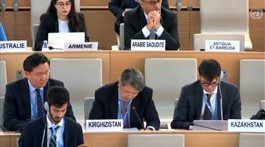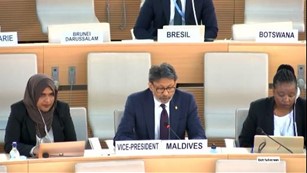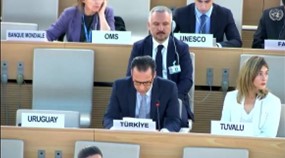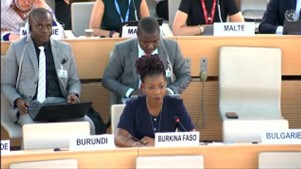The 53rd Session of the Human Rights Council
19th June – 14th July 2023
Agenda Item 3 – Promotion and protection of all human rights, civil, political, economic, social and cultural rights, including the right to development
Interactive Dialogue with the Working Group on Discrimination against Women and Girls
22nd June 2023

By Noor Sancho / GICJ
Executive Summary
In 2010, the mandate of the Working Group on discrimination against women and girls was endorsed by the Human Rights Council. The mandate was established in order to intensify efforts to eliminate all forms of discrimination against women and girls throughout the world. However, more than twenty years after its creation, women and girls worldwide are still subject to significant disadvantage. As a result of discriminatory laws and practices, equality has not been achieved in any country in the world, and pledges to eliminate discriminatory laws have not been fulfilled.
At the 53rd Regular Session of the Human Rights Council, the Chair of the Working Group on Discrimination against Women and Girls presented a thematic report addressing the gendered inequalities of poverty and two country reports on visits to Kyrgyzstan and the Maldives. The report intends to draw attention to feminist approaches to fight poverty that are grounded in human rights, ecological and social sustainability, which demonstrate alternatives to economic growth-based models of development. It gives several recommendations to Member States on how to fight against structural discrimination in society.
Additionally, at the 53rd session of the Human Rights Council, on the 22nd of June 2023, the Working Group on discrimination against women held an interactive dialogue on the gendered inequalities of poverty. The Chair of the Working Group pointed out that poverty and socio-economic inequalities are the result of inefficient economic choices. The Chair reiterated the importance of implementing equitable normative frameworks by States and international economic institutions. Delegations expressed their support for the report, stressing the importance of the full, equal and meaningful participation of women in all areas of life. Many delegations expressed their concerns over women and girls being disproportionately represented among the poorest and mentioned measures that can be implemented to strengthen women’s economic empowerment. Civil society organisations thanked the Working Group for its report, highlighting structural discriminations faced by marginalised women particularly in rural areas, and further asked the Working Group to analyse the impact of digital technologies on women and girls in marginalised communities.
Background
At its fifteenth session in 2010, the Human Rights Council adopted by consensus resolution 15/23 to establish a Working Group on the issue of discrimination against women in law and in practice. The mandate was created to intensify efforts to eliminate all forms of discrimination against women and girls around the world. It was recently renewed in June 2022 through resolution 50/18. The Working Group carries out its mandate in accordance with the resolutions of the Human Rights Council and in a spirit of constructive dialogue with Member States, civil society stakeholders, UN entities as well as national, regional and international human rights mechanisms. It holds an interactive dialogue at the Human Rights Council during the June session on its thematic and country visits reports.
The Working Group addresses the elimination of discrimination against women in law and in practice in all fields from the perspective of States’ obligations to protect women’s human rights. It emphasises that national, regional and international human rights mechanisms, as well as grass-roots activists, play critical roles in ensuring women have access to the full enjoyment of their human rights.
Report of the Working Group on discrimination against women and girls
The report by the Working Group on discrimination against women and girls, focuses on poverty and socio-economic inequality as the result of systemic failures that violate many human rights of women and girls and highlights alternative approaches. (A/HRC/53/39)
The report takes into consideration the regional and thematic consultations carried out by the Working Group. In 2022, 388 million women and girls were living in extreme poverty (as opposed to 372 million men and boys), and 83.7 percent of these women and girls were in two regions: sub-Saharan Africa (62.8 percent) and Central and South Asia (20.9 percent). The report underlines that women and girls’ inequality and poverty are the result of historical economic policy choices developed within patriarchal systems. These choices ignore the specific rights of girls and women while privileging the dominant forms of male and corporate power that perpetuate existing hierarchies. As outlined in the report, the neoliberal turn of the past forty years has increased poverty and inequality both between and within nations. For too long, most international and national economic policies have focused on how to integrate women and girls into unequal economic systems instead of remaking those systems. Most mainstream approaches to gender and poverty focus on increasing the economic productivity of individual women and fail to recognise and reward women’s unpaid care, domestic and agricultural work.
The report intends to draw attention to feminist proposals that call for principles grounded in human rights, ecological and social sustainability, as alternatives to economic growth-based models of development. The Working Group elaborates on several social movements championing a feminist and decolonial Global Green New Deal. The report sheds light on feminist workers’ alliances engaged in the development of alternative economic policies promoting, for instance, climate-friendly jobs.
In addition, the report emphasises that poverty is more than a lack of income or wealth. It is the result of a blatant systemic failure that leads to a vicious cycle of exclusion and discrimination violating the civil, cultural, economic, environmental, political and social rights of both present and future generations. Further, the report stresses that the right to live free from poverty and inequality should not only be observed in terms of economic deprivation. According to the international standards and legal framework, the right to equality and non-discrimination includes the right not to experience any kind of distinction, including sex, gender, socioeconomic condition, or other status. Moreover, human rights law recognizes that discrimination is both a cause and a consequence of poverty and inequalities.
The Working Group recommends that States should ground all laws and policies in the core human rights principles of equality and non-discrimination, and the meaningful participation of women and girls. The report also recommends States to ensure gender-responsive social protection as part of the right to an adequate standard of living. Moreover, States should identify the ways in which structural discrimination, legal frameworks and policy frameworks place women and girls at a greater/elevated/heightened risk of poverty and inequality and work towards preventing such risks. The Working Group also called on States to ensure the availability of sexual and reproductive health rights and to address menstrual poverty.
Furthermore, States should modify laws that criminalise the exercise of sexual and reproductive rights, including abortion, and other offences that disproportionately affect poor and marginalised women and girls. Lastly, States should adopt inclusive feminist approaches by ensuring the participation and consultation of diverse groups of women and girls in the design and implementation of economic and social laws to transform unequal socio-economic institutions.
Interactive Dialogue with the Working Group
Geneva, 22nd June 2023. At the 53rd Regular Session of the Human Rights Council, Ms. Dorothy Estrada-Tanck, the Chair of the Working Group on discrimination against women and girls held an interactive dialogue regarding the gendered inequalities of poverty and the visit reports to Kyrgyzstan and the Maldives.
 The Chair presented her thematic report highlighting that poverty and socio-economic inequalities are the result of blatant economic failures leading to a vicious cycle of exclusion and discrimination. She recommended adopting a human right based approach to poverty and inequality, based on non-discrimination, participation, accountability, empowerment, and the implementation of equitable normative frameworks by states and other duty bearers such as international economic institutions and corporations.
The Chair presented her thematic report highlighting that poverty and socio-economic inequalities are the result of blatant economic failures leading to a vicious cycle of exclusion and discrimination. She recommended adopting a human right based approach to poverty and inequality, based on non-discrimination, participation, accountability, empowerment, and the implementation of equitable normative frameworks by states and other duty bearers such as international economic institutions and corporations.
Ms. Dorothy Estrada-Tanck called for a shift away from excessive production and extraction towards an equitable order and the realisation of the right to development. Additionally, she recalled that the commitments made by states under the International Covenant on Economic Social and Economic Rights and the Declaration on the Right to Development require wealthy countries to assist low-income countries in the realisation of economic, social and cultural rights for everyone without discrimination and to ensure gender equality.
The Chair of the Working Group then went on to present her country visit reports in Kyrgyzstan and the Maldives. She praised the progress made and the measures implemented by both countries. However, she stressed that in Kyrgyzstan the judiciary and the Parliament do not comply with the ideal of gender parity and raised concerns about an increasingly hostile environment towards activists. Moreover, she invited the government to comply with its international human rights obligations regarding the strengthening of independence regarding its national human rights institutions.
Regarding the Maldives, the Chair welcomed the outstanding leadership of the Maldives by calling the attention of the international community to address the existential threat posed by climate change which creates specific risks for women and girls. She commended the parity achieved in civil service. However, she stressed that women are still underrepresented in decision making and leadership positions and are given few or no responsibilities. Furthermore, she highlighted rising religious fundamentalism, the shrinking space for civil society and organised efforts to undermine women’s participation in democracy. Moreover, the Chair mentioned that polygamy is legal in the Maldives and that female genital mutilation is not criminalised. In the ensuing debate, delegations welcomed the report A/HRC/53/39 of the Working Group.

Kyrgyzstan stated that all possible measures will be taken to overcome the deficiencies pointed out in the report of the Working Group. Moreover, Kyrgyzstan expressed its gratitude to the Working Group for noting the achievements made in terms of promotion of the rule of law and to strengthen democratic institutions since 1991, the year of its independence.

The Maldives pointed out that during the past four years, the government has remained committed to achieving gender equality and recognized the crucial need to strengthen its legislative frameworks by aligning them with its international obligations. Further, the Maldives mentioned that some actions proposed by the Working Group have already been implemented, such as eliminating taxes on hygiene products for women. The country also called the Council’s attention to the inherent vulnerabilities faced by the small island state which is riddled with the negative consequences of the climate crisis that disproportionately affects women and girls.
Mexico on behalf of Bolivia, Brazil, Chile, Colombia, Costa Rica, Ecuador, Honduras, Panama, Peru, Uruguay called for the implementation of multidimensional reforms with the substantial participation of women to reinforce access to basic services, redistribution and to promote equitable policies. The group of states reiterated its commitment to implement feminist and gender based approaches to prevent and address inequality and discrimination that is intersectional and gendered.
The European Union shared the Working Group’s concern that women and girls are disproportionately represented among the world’s poor. Additionally, the group of states mentioned that the European Commission has adopted an EU Gender Equality Strategy 2020-2025 and the EU Gender Action Plan III.
Estonia on behalf of the Nordic Baltic countries recalled that to this day, no country in the world has achieved full and substantial gender equality. Moreover, the group of states asked the Chair of the Working Group what can be done on a multilateral level and in UN fora to advance the economic policies so that women and girls everywhere and in all their diversity can enjoy human rights to the full extent.
 Türkiye on behalf of the MIKTA countries reaffirmed its strong support to the full, equal, and meaningful participation and the leadership of women in all areas of political, social, cultural, and economic life. In addition, the group of countries called on States, international and regional organisations to strengthen collaboration in order to eliminate all structural barriers that discriminate against women and girls.
Türkiye on behalf of the MIKTA countries reaffirmed its strong support to the full, equal, and meaningful participation and the leadership of women in all areas of political, social, cultural, and economic life. In addition, the group of countries called on States, international and regional organisations to strengthen collaboration in order to eliminate all structural barriers that discriminate against women and girls.
UN Women welcomed the Working Group’s report and applauded the Working Group for raising concerns regarding structural inequalities that perpetuate and deepen gender inequalities whilst threatening the realisation of women and girl’s rights.
 Burkina Faso stated that its laws guarantee equal protection for everyone and prohibit all forms of discrimination, especially discriminations based on sex. Furthermore, the country adopted a National Gender Strategy 2020-2024 to enhance equality between sexes and female empowerment. Moreover, the adoption of the National Strategy to Promote Female Entrepreneurship 2016-2025 allowed the country to strengthen women’s economic empowerment, especially those living in rural areas.
Burkina Faso stated that its laws guarantee equal protection for everyone and prohibit all forms of discrimination, especially discriminations based on sex. Furthermore, the country adopted a National Gender Strategy 2020-2024 to enhance equality between sexes and female empowerment. Moreover, the adoption of the National Strategy to Promote Female Entrepreneurship 2016-2025 allowed the country to strengthen women’s economic empowerment, especially those living in rural areas.
Portugal regretted that women continue to be disproportionately represented among people living in situations of poverty and agreed that renewed efforts are needed to counter the feminisation of poverty holding the elimination of socioeconomic inequalities at the base of these efforts. Furthermore, the country asked the Working Group for concrete recommendations to tackle the phenomenon of menstrual poverty.
UNICEF recalled that across the world around 1 billion children are multidimensionally poor and that adolescent girls are being disproportionately exposed to intimate partner violence and early pregnancy. In addition, UNICEF called on States to guarantee the rights of every woman and girl to equality, life free from poverty and inclusive social protection.
Costa Rica called for a feminist focus grounded on human rights and asked the Working Group what measures can concretely be taken to raise awareness and explain that the vision based on human rights is essential to combat inequalities faced by women and girls.
Australia on behalf of Canada and New Zealand reaffirmed that, as noted by the report, poverty and economic inequalities are indeed human rights issues. The group of states recalled that the right of women and girls to live in freedom from poverty and inequality are systematically tied to a range of socio-economic and human rights violations.
Civil society welcomed the report of the Working Group on gendered inequalities of poverty. Several NGOs highlighted structural discriminations faced by marginalised and rural women. One NGO pointed out the inequalities faced by women in rural communities, namely digital discrimination, and asked the Working Group whether it had planned to analyse the impact of digital technologies on women and girls, particularly those belonging to traditionally discriminated groups. Another NGO drew the Council’s attention to the dire situation and challenges faced by Tibetan women as well as China’s discrimination policies and practices.
After interventions from Member States, UN agencies and Civil Society Organizations, Ms. Dorothy Estrada-Tanck made her final remarks pointing out that several policies and concrete recommendations are included in the report. She recalled that the report tries to highlight the consequences of not considering women’s needs and rights when addressing poverty. She then quoted a number of women and girls formerly consulted by the Working Group, to convey and summarise the message of the report: “we are not poor, we are being impoverished”, “let us address not only the glass ceiling, but the class ceiling”, “you cannot entrepreneur your way out of poverty”.
In addition, the Chair of the Working Group recalled that the report also questions the dominant economic models under a human rights feminist approach, therefore making human rights become a practical tool. To conclude, Ms. Dorothy Estrada-Tanck called on Member States to continue placing women and girls’ voices at the centre, including through macroeconomic policies, to really address the intersectional forms of discrimination. Lastly, she called on Member States to continue listening to women’s voices and their proposals based on their needs and rights.
Position of Geneva International Centre for Justice
Geneva International Centre for Justice welcomes the report of the Working Group for its emphasis on the consequences of addressing poverty and inequality without taking into account the needs of women. GICJ remains committed to promoting equal power relations through negotiations for a new feminist based eco-social consensus and calls upon the international community to take effective measures to combat gender stereotypes and all forms of discrimination and gender-based violence.
As stated in the report, States and duty bearers must place the meaningful participation of women at the heart of their policies. In that regard, GICJ encourages states to ratify all core human rights Treaties and Optional Protocols, ratify the CEDAW Convention, eliminate reservations to CEDAW and ratify Optional Protocol to the International Covenant and Economic and Social Right.
Lastly, as outlined in the report, the current overlapping crises provide an opportunity to examine the human rights impact of global economic governance. In that regard, GICJ calls on international economic institutions to address overlapping inequalities that drive crises and to direct poverty eradication policies by reconsidering an economic model that prioritises unlimited economic growth and substitute it for one that places women and girls, half of humanity, at the centre.
women, Geneva, geneva4justice, Justice, GICJ, GenevaInternationalCentreForJustice







